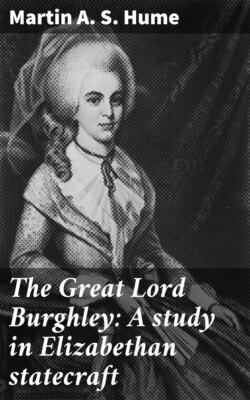The Great Lord Burghley: A study in Elizabethan statecraft

Реклама. ООО «ЛитРес», ИНН: 7719571260.
Оглавление
Martin A. S. Hume. The Great Lord Burghley: A study in Elizabethan statecraft
The Great Lord Burghley: A study in Elizabethan statecraft
Table of Contents
INTRODUCTION
THE GREAT LORD BURGHLEY
CHAPTER I. 1520–1549
CHAPTER II. 1550–1553
CHAPTER III. 1553–1558
CHAPTER IV. 1559–1560
CHAPTER V. 1560–1561
CHAPTER VI. 1562–1564
CHAPTER VII. 1564–1566
CHAPTER VIII. 1566–1567
CHAPTER IX. 1568–1569
CHAPTER X. 1570–1572
CHAPTER XI. 1572–1576
CHAPTER XII. 1576–1580
CHAPTER XIII. 1581–1584
CHAPTER XIV. 1584–1587
CHAPTER XV. 1588–1593
CHAPTER XVI. 1594–1598
FOOTNOTES
INDEX
Отрывок из книги
Martin A. S. Hume
Published by Good Press, 2019
.....
With such friends in the dominant party as Cooke, Cheke, Cranmer, and Seymour, it is not surprising that William Cecil’s career emerged from obscurity and uncertainty almost as soon as the new Government was established. For a young man of twenty-seven he had already not done badly. His father was still alive, but in the first year of Edward VI. the office of custos brevium, of which the old King had given him the reversion five years before, fell in, and this brought him, in salary and fees, £240 per annum (£6, 13s. 4d. salary and rest fees at the four law terms), and in addition to this, according to his household biographer, the Lord Protector appointed him his Master of Requests soon after assuming power. That he held some such office from the summer of 1547 is certain, as from that date forward great numbers of letters exist written to him in relation to suits and petitions addressed to the Protector. The office, as then constituted, appears to have been an innovation, as being attached to Somerset’s personal household,[12] and intended to relieve him from the trouble of himself examining petitions and suits. In any case Cecil’s assiduity and patience appear thus early to have been acknowledged, to judge by the tone of most of his correspondents, many of whom belonged to a much more exalted social position than himself. In June 1547 Sir Thomas Darcy informs him[13] that (evidently by order) he had inquired into the love affair between “Mistress Dorothy” and the young Earl of Oxford—who was a ward—and desires to know whether the Protector wishes the match to be prevented or not; and in the following month Lady Browne wrote to him in terms of intimate friendship, begging him to use his influence with Somerset to appoint her brother to the coming expedition to Scotland.[14]
The master and fellows of his old college, St. John’s, too, were anxious to propitiate the rising official and to bespeak his interest in favour of their foundation,[15] and the widowed Duchess of Suffolk (Lady Willoughby) consulted him in all her difficulties. The war with France was suspended, though the English forces holding Boulogne were closely beleaguered, and Somerset’s greed was diverting the money which should have been spent in war preparations; but in pursuance of the traditional policy of England, it became a question almost of national existence when it was seen that the French intrigues for the marriage of the child Queen of Scots and the final suppression of the rising reform party in Scotland were likely to succeed. Arran had signed the treaty with Henry for the marriage of Edward and Mary; but he, and especially the Queen-mother, Mary of Lorraine, had resisted the deportation of the infant Queen to England. It is possible that some arrangement might have been arrived at had not the ill-advised murder of Cardinal Beaton and the subsequent anarchy given to the new King of France, Henry II., an excuse for armed interference in protection of the Catholic party. Then it became incumbent upon the Protector to fight the Scots at all hazards, or French influence over the Border threatened to become permanent; a double danger, now that the religious question tended to alienate England from her secular alliance with the House of Burgundy. When Somerset made his rapid march upon Scotland with an army of 18,000 men, supported by a powerful fleet, in September 1547, his trusted Cecil attended him in the capacity apparently of provost-marshal, in conjunction with the chronicler of the campaign, William Patten.[16] The decisive battle of Pinkie was fought on the 10th September 1547, and was in a great measure won by the dash, at a critical moment, of the Spanish and Italian auxiliaries whom Somerset had enlisted. According to the “household” historian so often quoted,[17] Cecil narrowly escaped death from a cannon shot at Pinkie, but no other mention of the fact is to be found. It has been doubted whether at this time he held still the office of Master of Requests, in which he is said to have been succeeded by his old college friend Sir Thomas Smith,[18] but there was no break in his close connection in some capacity with the Protector. About five months after Pinkie, in a letter to Lord Cobham, Somerset calls him “my servant William Cecill,”[19] and refers to letters written to him on his behalf; and in June 1548 the powerful Earl of Warwick, who was soon to supplant Somerset, writes to Cecil, almost humbly thanking him for forwarding some request of his to the Protector.[20]
.....